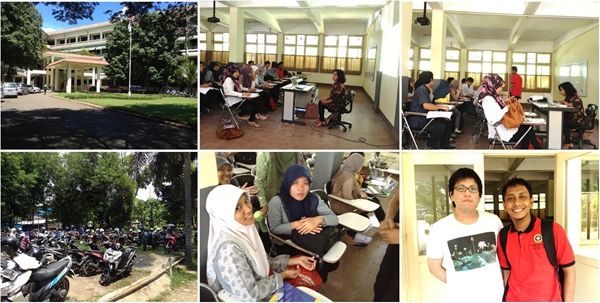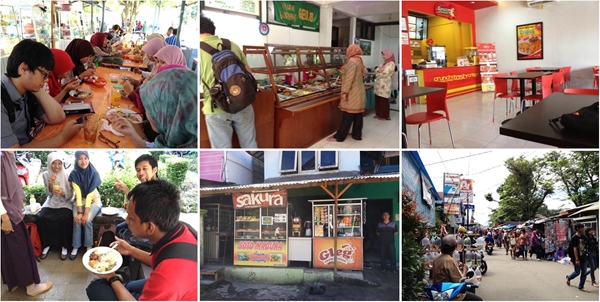Alumni Voice
IPBに留学して感じた点と注意点(高島勇介)
修士論文研究
- 修士論文研究の大まかな流れは、1.指導教員に研究計画(プロポーザル)提出、修正→ 2.コロキウム(実験計画の発表)→ 3.実験、修論執筆→ 4.セミナー(修論発表)→ 5.Final Exam(最終審査)です。
- インドネシアでは、日本のように自由に実験し、自由に研究を進められるわけではありません。通常、インドネシアの学生は修士1年の間に授業を履修しながらプロポーザルを作成し、修士2年になってから研究室に配属されます。そのため、渡航してすぐに実験を始められるとは限りません。
- 研究室に配属され、修士論文研究を開始するには、プロポーザルを作成する必要があります。このプロポーザルは、日本の簡単な“研究計画”とは異なり、Introduction、Literature Review、Materials and Methods、Referenceまで詳細に書く必要があり、「修士論文の結果と考察以外のほぼ完成型」が求められます。これに実験スケジュール、使用器具の種類や個数などを細かく記載し、指導教員に認められてから研究がスタートします。可能であれば、渡航前に大部分を作成しておくことが望ましいと思います。
- 私の場合は国定公園での実験試料採取が必要でした。許可を得るには現地管理局にプロポーザルを提出する必要があります。従って、プロポーザルが完成しない限り、国定公園での調査はできませんでした。

授業(講義)
- 修了にはTOEFLのスコア(500点以上)が必要ですので、日本で取得しておくことをお勧めします。インドネシアでも受験できますが、そもそも英語の勉強をしっかりしてから渡航しないと、授業についていくことすら難しいかも知れません。
- 渡航したらすぐに学生証の発行手続きをおこなって下さい。また、学期が始まったら授業登録をする必要があります。登録にあたっては指導教員とよく相談し、現地の友達からも積極的に情報を得て、履修ミスがないように気を付けて下さい。
- 授業はほぼ英語ですが、スライドや説明の一部でインドネシア語が混ざることがあります。試験は英語で作成してもらえるので、大きな心配はありません。
- ただ、授業形式は日本とは大きく異なり、教科書に忠実な暗記型(アメリカ的)です。私の場合は専攻分野が日本とほとんど同じで、学部で習った授業(特に生理学、遺伝学)と重複している部分があったため、内容の理解はスムーズでした。
- 教科書は何らかの形で手に入るので、それらを用いて授業で行った内容を勉強しています(授業も教科書に沿ってスライドが作られている場合が多い)。
- 講義内容は学部の時と似ていました。試験も同様です。しかし、より詳しい内容まで踏み込む場合もあるので、事前にしっかり勉強してきた方がいいと思います。専攻分野が日本と若干異なる場合は、かなり大変になると思います。
- テスト問題はEssay形式が主で、答えるためには文章作成の能力が必要になります。問題数も比較的多いので、早く正確に書く訓練が必要です。私の場合は、生理学なら各代謝経路など、遺伝学ならDNAの複製・転写・翻訳などを、筆記で回答しました。事前に訓練しておくと良いと思います。なお、試験中は電子辞書の使用が認められていました。可能なら、日本にいるうちに有名な生物学の教科書などを購入して、演習問題をこなしておくといいと思います。
授業(実験)
- 学生実験は週2日ありましたが、丸1日時間をとられることが多くありました。班分けや器具の準備など事前の段取りが曖昧で、教員は来ずにTAや技官の指導で実施されるため、無駄な時間が過ぎていくことも多くありました。空いた時間をうまく使うなど、工夫が必要になります。
- 学生実験の進行が遅れ、週2回のはずが週3~4回になることもありました。根気と柔軟性とが必要です。
生活面
- 私はボゴール農科大学内の国際寮(Asrama International)に居住しています。ひと月の家賃は一万円程度で、周りの貸部屋(安いところは年間三万円程度)に比べれば高いですが、設備は整っています(WiFiは学内で最も速い、しかし自室までは届かない)。エアコンはついています。また、学内にあるので授業に行きやすく、非常に便利です。シャワーはもちろん水だけです。気温が高いので大丈夫ですが、お湯が恋しくなることはあります。
- 洗濯や掃除は有料サービスがあります。洗濯ものの量によりますが、月千円程度で済みます。
- インドネシアの学生は、全員が英語を話せるわけではありません。しかし、しっかり話せる人も一割程度はいます。日本とあまり変わらないかも知れません。
- 渡航直後は腹痛になったり、体調を崩したりしましたが、その後は大丈夫になりました。最初、お腹の調子が悪くなるのは仕方のないことかも知れません。次第に体が慣れ、また衛生的なお店を覚えれば、体を壊すことはありません。

Being a double degree student is a proud and challenge (Ms Windi)
Congratulations to all students who have been accepted as double degree student. It's going to be your honors and surely, challenge. In my view, DDP was very unique program, due to study in two different universities, with different culture and academic atmosphere. It is also challenging, since you have to able to finish the program within two years. Well, it's sound so difficult firstly, but don't worry, you can do it. You've been chosen, so everyone put the trust on you.
I would like to share you, what I did during I stayed in Japan, also some tips, that might be useful to pass DDP within 2 years. Good luck and cheers.
Prepare your self.
Well, the first thing you have to do is prepare your self. Make sure your self that you will be ready to live in Japan where it is very different situation with your own country. Make sure also that you have to do your best, in order to be able finish the DDP. By preparing your self, it's going to be a good step ahead.
Manage your time very well
Since the DDP is a very tight program, regarding the double thesis that you have to write. You have to be able to manage your time very well. Make a good schedule, a list to do for today, tomorrow and so on. By owned your agenda, you will be able to manage your time. But don't worry for not enjoying your time in Japan. Go for holiday is very important. There are many interesting places in Japan. In my case, I always make schedule, then I know well what should I do then. Further, I'm working hard on weekdays, but often I played on weekend. I went to Tokyo, Kyoto, Nara and climbed Fuji Mountain. It was very exciting for me.
Don't worry about Japanese language
Language is very important for daily communication. Mostly Japanese speak on Japanese language and sometimes its very difficult for foreign in understanding Japanese language for the first time. But don't worry about Japanese language. Ibaraki university provide Japanese class for foreign. It holds 1 times a week. Also, if you have more time, you can join Japanese class in International Community in Ami Chuo Ko-minkan. My tips: don't be shy and afraid on try to speak Japanese language. Just try to say something and make communication. Also, do not pointed too much on Japanese grammatical. Just Speak!! It's a good step ahead.
Make a good friendship
It's sound very good when you have many friends in Japan. However, you are a foreign. Making good relationship with everyone will help you a lot to survive here. It's also will be memorable time during your stay in Japan. Don't worry about Japanese daily live. You will have a student tutor, who is very kind help you a lot. Make a good relationship with her/him. Your Tutor is your best friend.
Adapt your self on Japanese culture
Japanese culture is different with your own country culture. To understand Japanese culture, be adapt with Japanese, make good communication and friendship. By the time, you will understand Japanese culture, about how they work, about social liv ect. Be active don't be passive, then you will be able to adapt with Japanese culture.
About Halal Food and Praying (For moeslem).
I notice this pointed for moeslem. Probably, you will be very hard to find Halal food or a place for praying. I would like to give you some suggestion. For food, please read the ingredients firstly before you eat. Although the ingredients also written in Japanese language, but remember the important ones such as pork (豚肉), Sake (酒)、alcohol (アルコール). If it is very hard to remember kanji, you can ask your friend. Just ask to he/she for making sure you can eat it or not. About halal store, you also can find it in several shops, such as in Gyoumu Supa, near Tsuchiura city, or Hanamasa, in Tsukuba city. They sell Halal Chicken and meet that you can eat. Do not be shy to ask, they will help you very kindly. For praying time, it's might be hard to find Masjid or any proper place for praying. The closest masjid was in Tsukuba city, about 30 minutes by car. For the daily praying, you should ask your sensei/tutor, where is the good place for praying. In my case, I always pray in FSC Library or in research room.